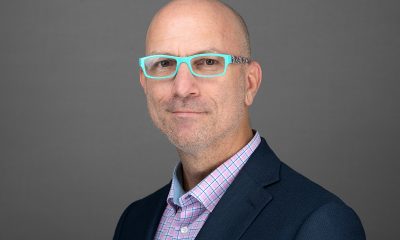Local
Gay GOP donor helped fund ‘Hide/Seek’ exhibit
N.Y. businessman wants controversial crucifix video restored to Portrait Gallery

Editor’s note: a Blade review of the exhibit is here.
A gay Republican businessman from New York who led the fundraising campaign to underwrite the National Portrait Gallery’s gay exhibit “Hide/Seek” has added his voice to those calling on the gallery to reinstate a controversial video by the late gay artist David Wojnarowicz.
Donald Capoccia, a real estate developer who was appointed by President George W. Bush in 2001 to serve on the U.S. Commission on Fine Arts, and his partner, Tommie Pegues, sent a letter this week to the head of the Smithsonian Institution requesting that the video be “returned to the exhibition floor, without fail, and as soon as possible.”
The role of Capoccia and other gay donors who helped fund the exhibit has been overshadowed by a series of events beginning Dec. 1, when National Portrait Gallery director Martin Sullivan removed the Wojnarowicz video from the exhibit.
Sullivan said he acted in response to complaints by the Catholic League and Republican members of Congress that an 11-second segment of the video, which showed ants crawling over a crucifix, was offensive and an anti-Christian slur.
“I regret that some reports about the exhibit have created an impression that the video is intentionally sacrilegious,” Sullivan said in a statement. “In fact, the artist’s intention was to depict the suffering of an AIDS victim. It was not the intention of the museum to offend. We have removed the video.”
News of Sullivan’s decision, which surfaced on World AIDS Day, prompted an outcry among gay and AIDS activists and leaders of the arts community, who denounced the action as a form of censorship.
Sullivan told the New York Times he was sympathetic to the activists and artists who decried the decision to pull the video. He said his decision, which he said had the support of the leaders of the Smithsonian Institution, was aimed at quelling a “distraction” from the overall exhibit, which features important works from leading gay and lesbian artists.
The National Portrait Gallery is an arm of the Smithsonian Institution, which, among other things, operates the federally funded museums in the nation’s capital.
Among those who criticized the video and the exhibit itself were Rep. John Boehner (R-Ohio), who will become Speaker of the House in January, and Rep. Eric Cantor (R-Va.), who will become majority leader at the same time, when Republicans assume control of the House.
Rep. James Moran (D-Va.), whose district includes the Northern Virginia suburbs just outside D.C., said Boehner and Cantor along with other Republicans were exploiting an exhibit, in which just 11 seconds of a single video was offensive to some, for political gain.
Cantor said his concern was that the Smithsonian Institution, of which the National Portrait Gallery is a part, was using government funds to pay for an exhibit that was highly offensive to many Americans.
Cantor and other critics of the exhibit dismissed assertions by Smithsonian officials that private donors picked up the cost of the exhibit, saying taxpayer funds are used for the upkeep of the building and to pay the salaries of Portrait Gallery employees who operate the exhibit.
The National Portrait Gallery has called the exhibit, “Hide/Seek: Difference and Desire in American Portraiture,” the nation’s first major museum exhibition to “focus on sexual difference in the making of modern American portraiture.”
LGBT activists involved in the arts have said the exhibit also shows how gay artists, through their varied works, have grappled with anti-gay bias and prejudice against different forms of gender expression over the past century.
Phillip Clark, chair of the board of D.C.’s Rainbow History Project, called David Wojnarowicz, a gay man who died of AIDS in 1992, an important figure in the LGBT arts community. Clark noted that Wojnarowicz used ants in his video and still photography works as a symbol for depicting human suffering and injustice.
“The image of the Christ figure attacked by ants in ‘A Fire in My Belly’ [the name of the Wojnarowicz video pulled from the exhibit], far from being sacrilegious, is actually a commentary on the destructiveness of society toward AIDS patients in the 1980s,” Clark said.
D.C. gay rights advocate Charles Francis, who recruited former President Gerald Ford to become a board member of a national gay GOP group, the Republican Unity Coalition, before Francis left the Republican Party in 2004, called on the LGBT community to remain supportive of the Smithsonian.
Francis, who joined Capoccia in contributing money to the Hide/Seek exhibit, said he disagrees with the decision by the Portrait Gallery to remove the Wojnarowicz video. But he said the gallery and the Smithsonian as a whole have been supportive of LGBT-related projects in recent years.
“The Smithsonian is doing a great job step by step in expanding and including LGBT Americans in the stories they tell, in the collections they show,” he said. “I think it’s time for the gay community to rally around the Smithsonian.”
PHOTO: “Self-Portrait — Robert Mapplethorpe,” a 1975 Polaroid print, one of the images in the Hide/Seek exhibit at the National Portrait Gallery. Image courtesy of the Estate of Robert Mapplethorpe, New York City.
District of Columbia
Gay GOP group hosts Ernst, 3 House members — all of whom oppose Equality Act
Log Cabin, congressional guest speakers mum on June 25 event

U.S. Sen. Joni Ernst (R-Iowa) and three women Republican members of the U.S. House appeared as guest speakers at the June 25 meeting of Log Cabin Republicans of D.C., the local chapter of the national LGBTQ Republican group with that same name.
The U.S. House members who joined Ernst as guest speakers at the Log Cabin meeting were Celeste Maloy (R-Utah), Kat Cammack (R-Fla.), and Julia Letlow (R-La.).
Neither D.C. Log Cabin Republicans President Andrew Minik nor spokespersons for Ernst or the three congresswomen immediately responded to a request by the Washington Blade for comment on the GOP lawmakers’ appearance at an LGBTQ GOP group’s meeting.
“Please join us for an inspiring evening as we celebrate and recognize the bold leadership and accomplishments of Republican women in Congress,” a D.C Log Cabin announcement sent to its members states.
“This month’s meeting will highlight the efforts of the Republican Women’s Caucus and explore key issues such as the Protection of Women and Girls In Sports Act and the broader fight to preserve women’s spaces in society,” the message says.
It was referring to legislation pending in Congress calling for banning transgender women from participating in women’s sports events.
According to media reports, Ernst and the three congresswomen have expressed opposition to the Equality Act, the longstanding bill pending in Congress calling for prohibiting discrimination based on sexual orientation and gender identity in the areas of employment, housing, and public accommodations.
The Log Cabin announcement says the meeting was scheduled to take place at the Royal Sands Social Club, which is a restaurant and bar at 26 N St., S.E. in the city’s Navy Yard area.
D.C. Log Cabin member Stuart West, who attended the meeting, confirmed that Ernst and the three congresswomen showed up and spoke at the event.
“It was a good turnout,” he said. “I would definitely say probably 30 or 40 people attended.” West added, “Four women came to talk to a group of mostly gay men. That’s something you don’t see very often.”
District of Columbia
D.C. police seek public’s help in July 5 murder of trans woman
Relative disputes initial decision not to list case as hate crime

D.C. police are seeking help from the public in their investigation into the murder of a transgender woman who they say was shot to death at about 12:30 a.m. on Saturday, July 5, on the 2000 block of Benning Road, N.E.
But the police announcement of the fatal shooting and a police report obtained by the Washington Blade do not identify the victim, 28-year-old Daquane ‘Dream’ Johnson of Northeast D.C., as transgender. And the police report says the shooting is not currently listed as a suspected hate crime.
It was local transgender activists and one of Johnson’s family members, her aunt, who confirmed she was transgender and said information they obtained indicates the killing could have been a hate crime.
“On Saturday, July 5, at approximately 12:51 a.m., Sixth District officers were flagged down in the 2000 block of Benning Road, Northeast, for an unconscious female,” a July 5 D.C. police statement says. “Upon arrival, officers located an adult female victim suffering from gunshot wounds,” it says.
“D.C. Fire and EMS responded to the scene and transported the victim to a local hospital where after all lifesaving efforts failed and the victim was pronounced dead,” the statement says.
A separate police flyer with a photo of Johnson announces an award of $25,000 was being offered for information leading to the arrest and conviction of the person or persons responsible for the murder.
The flyer identifies D.C. police Homicide Detective Natasha Kennedy as being the lead investigator in the case and says anyone with information about the case should contact her at 202-380-6198.
Longtime D.C. transgender rights advocate Earline Budd told the Blade that one of the police investigators contacted her about the case and that she also spoke to Detective Kennedy. Budd said police confirmed to her that Johnson was a transgender woman.

One of Johnson’s family members, Vanna Terrell, who identified herself as Johnson’s aunt, told the Blade that Johnson used the first name of Dream and had planned to legally adopt that name instead of Daquane but had not gotten around to doing so.
Terrell said she and other family members learned more about the incident when one of two teenage high school students who knew Johnson’s brother contacted a friend and told the friend that they recognized Johnson as they witnessed the shooting. Terrell said the friend then called her to tell her what the friend learned from the two witnesses.
According to Terrell, the witnesses reportedly saw three men approach Johnson as Johnson walked along Benning Road and one of them called Johnson a derogatory name, leading Terrell to believe the men recognized Johnson as a transgender woman.
Terrell said one of the witnesses told the friend, who spoke to Terrell, that the man who shot Johnson kept shooting her until all of the bullets were fired. Budd, who said she spoke to Terrell, who also told her what the witnesses reported, said she believed the multiple shots fired by the shooter was an “overkill” that appears to have been a hate crime. Terrell said she too believes the murder was a hate crime.
In response to an inquiry from the Blade, Officer Ebony Major, a D.C. police spokesperson, stated in an email, “At this point there is nothing in the investigation that indicates the offense was motivated by hate or bias.”
Terrell said a memorial gathering to honor Johnson’s life was scheduled to be held Saturday, July 12, at River Terrace Park, which is located at 500 36th St., N.E. not far from where the shooting occurred.

District of Columbia
LGBTQ voters divided in Ward 8 special election
All four candidates on DC Council seat ballot are allies

Political observers, including LGBTQ activists, believe LGBTQ voters in Ward 8, like most if not all voters in the ward, are divided over which of the four candidates to support in the July 15 special election to fill the ward’s vacant D.C. Council seat.
Each of the four candidates, all of whom are Democrats, including ousted Ward 8 council member Trayon White, who is running to recapture his seat, have expressed support for LGBTQ related issues.
The special election was called earlier this year after the D.C. Council voted unanimously to expel White following his indictment and arrest by the FBI on a federal bribery charge in August 2024.
He has pleaded not guilty to the charge and under D.C. law he can legally run for and regain his council seat until the time he is convicted of the charge. His trial is scheduled to begin in January 2026.
The three candidates challenging White — Sheila Bunn, Mike Austin, and Salim Adofo — are longtime Ward 8 community advocates who have been involved in local government affairs for many years and, according to LGBTQ activists who know them, have been supportive of LGBTQ rights.
White also has a record of supporting LGBTQ issues while serving on the council since 2017. Following his indictment, he won re-election by a wide margin in the November 2024 general election against a lesser-known Republican opponent.
Political observers say White’s indictment on a bribery charge is likely to alienate some of his past supporters, but they say he remains popular in the ward, and with three candidates dividing the opposition vote he could win the election with less than 50 percent of the divided vote count.
Two of the candidates, Bunn and Adofo, responded to a request by the Washington Blade sent to each of the four candidates asking for a statement summarizing their positions on LGBTQ related issues. In their respective statements Bunn and Adofo expressed strong support on a wide range of LGBTQ issues.
“In my nearly 30 years of public service, I have consistently supported the rights and worked to improve the quality of life for the LGBTQIA+ community,” Bunn said in her statement. She noted that much of her work on behalf of LGBTQ rights took place when she served as chief of staff for D.C. Congressional Delegate Eleanor Holmes Norton and as a senior staff member for former D.C. Mayor Vincent Gray.
In his statement, Adofo said he advocated for a wide range of LGBTQ issues, including housing programs for homeless LGBTQ youth and supportive employment training programs for transgender residents.
“At the heart of our platform is a steadfast commitment to uplifting LGBTQ+ communities, ensuring that policy is shaped not just for them, but with them,” his statement says. Adofo’s positions in support of LGBTQ rights are also posted on his campaign website.
GLAA D.C, formerly known as the Gay and Lesbian Activists of Washington, released its ratings of three of the four candidates on June 22, based on its recent policy of basing its ratings mostly on non-LGBTQ specific issues. The group rates candidates on a scale of -10, the lowest possible rating, to +10, its highest rating.
It assigned a rating of +7.5 for Bunn, +6.5 for Austin, and +4.5 for Adofo. In a statement accompanying its ratings, GLAA said each of the three have a record of support on LGBTQ issues, but they lost rating points for not supporting non-LGBTQ related issues deemed important by GLAA.
GLAA said it did not issue a rating for White based on its policy of not rating candidates who are removed from office or resign due to allegations of ethics violations.
The Capital Stonewall Democrats, D.C.’s largest local LGBTQ political group, chose not to make an endorsement in the Ward 8 special election.
“We thought that this is best because this is a special election and in these unfamiliar times, we decided not to take a stand,” Howard Garrett, the group’s president, told the Blade.
Ward 8 gay Democratic activist Phil Pannell is supporting Adofo, he told the Blade, on grounds of Adofo’s strong support on LGBTQ issues and Adofo’s role as the only candidate in the Ward 8 special election who supported Initiative 83, the ballot measure passed by D.C. voters in November 2024 calling for a ranked choice voting system and open D.C. primaries. A lawsuit challenging the initiative filed by the D.C. Democratic Party has delayed its implementation.
Another longtime Ward 8 gay Democratic activist, David Meadows, is supporting Bunn. Meadows cites Bunn’s support for LGBTQ rights and her positions on other issues he supports as his reason for backing her candidacy.
The D.C. Board of Elections website shows that the board mailed ballots for the special election to all Ward 8 registered voters. The website shows that as of July 7, 2,483 voters sent back their ballots by mail or placed them in drop boxes located throughout the ward.
Early in-person voting at several polling places was scheduled to begin July 11, the website says, prior to the official election date of July 15 at all polling places throughout the ward.
Salim Adofo statement on LGBTQ issues:
Our campaign is rooted in the belief that everyone deserves to live with dignity, security, and opportunity. We are committed to building a safer, healthier, and more equitable District for all — where every voice is heard and every community is empowered. At the heart of our platform is a steadfast commitment to uplifting LGBTQ+ communities, ensuring that policy is shaped not just for them, but with them. We recognize that the fight for equity is interconnected, and we prioritize action in the areas that most deeply impact our residents’ daily lives. As [a] council member, I will advocate for healthcare for all, boost funding for HIV/AIDS, Hepatitis, STD, and TB Administration (HAHSTA) programs to address disparities in health outcomes.
• Expand access to care by exempting digital-only telehealth services from the Certificate of Need (CON) process and increasing funding through the Department of Behavioral Health (DBH).
• Build a culturally competent workforce by removing licensure barriers and expanding the pipeline of LGBTQ+ mental health providers.
• Employment and economic equity: sustain workforce development efforts like Project LEAP, a successful investment in economic empowerment for TGD residents.
• Foster public-private partnerships by requiring D.C. HR to work with labor unions and local employers to host trans-affirming job fairs.
• Fund community-led training by supporting programs developed by TGD organizations, modeled after California’s Transgender Economic Empowerment Initiative.
• Housing with dignity: every LGBTQ+ resident deserves stable, affirming, and permanent housing. End youth homelessness with a community-centered strategic plan focused on expanding permanent housing and wraparound services.
• Support inclusive housing by continuing funding for LGBTQ+ housing vouchers and senior housing initiatives.
• Safety and community support: create safe shelters by investing $2 million in a 20-bed LGBTQIA2S+ shelter for survivors of intimate partner violence and sexual assault.
• Empower community organizations with no-cost capacity-building support and streamlined access to D.C. grants for LGBTQ+-serving CBOs.
Sheila Bunn statement on LGBTQ issues:
In my nearly 30 years of public service, I have consistently supported the rights and worked to improve the quality of life for the LGBTQIA+ community.
As chief of staff to Congresswoman Eleanor Holmes Norton, I helped prevent Congress from overturning the District’s 2009 marriage equality bill and worked on removing congressional riders from the District’s budget that prohibited the expenditure of locally raised funds for our needle-exchange program, which has been pivotal in HIV/AIDS prevention.
As part of Mayor Vincent C. Gray’s senior staff, I assisted in launching the District’s transgender employment initiative under the Project Empowerment Program, increasing training and job opportunities for transgender residents. We also employed a member of the transgender cohort in the Mayor’s Office of Community Affairs after their tenure, demonstrating our commitment to the program. I facilitated efforts to end health insurance discrimination based on gender identity with DISB’s 2013 bulletin, ensuring coverage for services like mastectomies and hormone replacement therapy. Additionally, I helped to coordinate Mayor Gray’s first LGBTQIA+ Youth Town Hall to address the concerns of LGBTQIA+ youth and participated in cultural competency training to better support the District’s significant LGBTQIA+ population.
Currently, I am a member of the Capital Stonewall Democrats, actively engaging in Pride events and supporting LGBTQIA+ causes like the DC LGBTQ+ Community Center, a one-stop shop for services and programs with critical social service partners. Through direct outreach to organizations serving the LGBTQIA+ community, I aim to understand and represent their issues effectively. I look forward to collaborating with GLAA, Capital Stonewall Democrats, and other allied organizations to shape legislation and policies that benefit our LGBTQIA+ residents and all District residents.
-

 Virginia2 days ago
Virginia2 days agoDefying trends, new LGBTQ center opens in rural Winchester, Va.
-

 South Africa5 days ago
South Africa5 days agoLesbian feminist becomes South African MP
-

 Travel4 days ago
Travel4 days agoManchester is vibrant tapestry of culture, history, and Pride
-

 Opinions3 days ago
Opinions3 days agoUSAID’s demise: America’s global betrayal of trust with LGBTQ people












